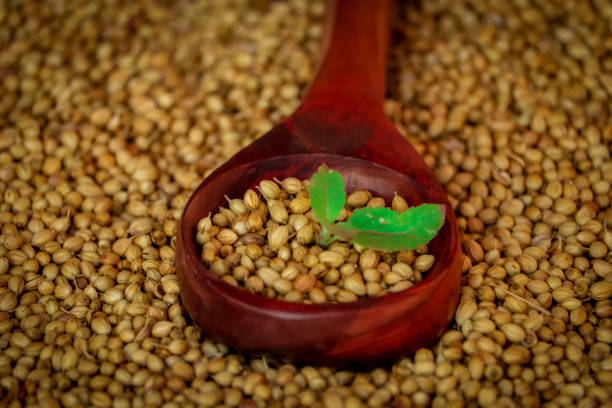Koriandri brings centuries of healing and culinary prestige to your table. Known as coriander seeds, it boosts dishes and delivers wellness at the same time. Let’s dive into its world with structure and clarity.
What Is Koriandri?
Koriandri refers to the dried seeds of the coriander plant (Coriandrum sativum). While Western kitchens call the leaves cilantro, it refers specifically to the seeds. They offer a unique citrusy and nutty flavor, popular across cuisines and traditional medicine.
Distinctive vs. Leaves: Why Koriandri Stands Out
People often confuse koriandri with cilantro. However, the seeds and leaves serve different roles. Whereas the leaves add fresh, bright flavors, it seeds add deep aroma and subtle sweetness. This contrast makes each part valuable in its own way.
A Journey Through History
You’ll find koriandri in ancient Ayurvedic, Chinese, and Middle Eastern healing practices. Traditionally, healers used it to ease bloating, calm the mind, and support digestion. Herbalists in Europe even recommended koriandri tea for anxiety and upset stomachs.
Nutritional Snapshot
It packs a punch in nutrients. It supplies vitamin C, B‑complex vitamins (like thiamine and niacin), iron, magnesium, and potassium. Even small amounts help you get more antioxidants and trace minerals in your diet.
Key Health Benefits of Koriandri
Improves digestion. It stimulates bile and enzyme release, helping you digest food more easily. Try drinking water with soaked its seeds for relief from bloating or indigestion.
Supports detox. It helps the liver process toxins and supports natural cleansing processes. Many people drink koriandri water first thing in the morning to flush out impurities.
Reduces inflammation. Its antioxidants help calm inflammation in the body. People often use a simple paste of crushed it on sore joints or irritated skin for relief.
Helps regulate blood sugar. Studies suggest that its seeds may encourage insulin release, helping blood sugar stay in balance.
Naturally supports blood pressure. Since it contains potassium and is low in sodium,it encourages relaxed vessels and steady circulation.
Boosts metabolism. It helps your body burn energy more effectively while controlling cravings. Drinking koriandri water before meals can help moderate appetite.
Strengthens immunity. Its antimicrobial and antioxidant actions help defend against illnesses, making it a great seasonal ally.
Supports women’s health. Healers traditionally used it to stabilize hormones, relieve PMS, and support postnatal wellness.
Enhances skin, hair, and beauty. A paste of koriandri can clear acne and brighten the skin. Meanwhile, it‑infused oil massages can reduce dandruff and encourage hair growth.
Culinary Uses Made Easy
It tastes great in curries, soups, pickles, and spice blends like garam masala. Toasting the seeds before using them releases their full aroma and depth of flavor.
Homemade Remedies You Can Try
- Digestive aid: Soak a teaspoon of koriandri overnight and sip the water in the morning.
- Cold remedy: Simmer coriander seeds with ginger and turmeric whenever you’re nursing a cold.
- Acne relief: Blend its seeds with honey into a smooth paste and apply it gently.
Tips for Storage and Use
To preserve flavor, store whole koriandri seeds in an airtight container away from light and heat. Whole seeds last nearly a year, while ground seeds fade in just a few months.
Cooking with Confidence: Where to Buy
Look for organic koriandri from reputable brands or local spice shops. High-quality seeds carry certificates or organic labels and stay fresher longer.
Grow Koriandri at Home
You can easily grow coriander in a sunny window box. Just sow seeds, water lightly, and watch them sprout in a few weeks. You’ll get fresh leaves—and eventually your own seeds.
Koriandri in Ritual and Sustainability
In many cultures, koriandri features in cleansing rituals and protective charms. It also makes sustainable farming sense: the plant needs little input and supports natural biodiversity.
Final Word: Keep Koriandri Close
You don’t just invite new flavor when you use koriandri—you boost your health. From soothing tummies to supporting skin, mind, and spirit, it fits both your kitchen and wellness routine.
FAQs
What’s another name for koriandri?
In English, people usually call it coriander seeds.
Can it soothe bloating?
Yes! Many use soaked seed water as a natural remedy for digestive discomfort.
Is koriandri safe while pregnant?
It’s okay as a spice, but always talk to a doctor before using it for health reasons.
How often should you use it?
Three to four times weekly works well for daily benefits.
Will it help with weight loss?
Its metabolism and appetite effects can support weight management.
Does it spoil easily?
Whole seeds stay potent for about a year; ground forms lose strength faster.
